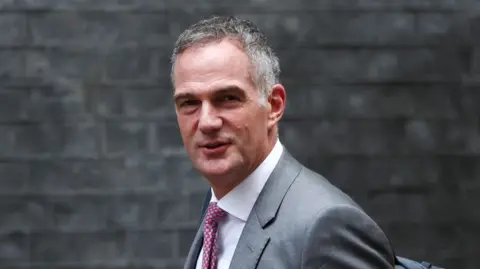 EPA/EFE/REX/Shutterstock
EPA/EFE/REX/ShutterstockA cabinet minister has said restricting winter fuel payments does not “sit easily” with him, after estimates it would increase poverty among pensioners.
Technology Secretary Peter Kyle said the decision to restrict the £300 payment to all but the poorest pensioners this winter was made with a “heavy heart”.
But he insisted the “difficult” decision was required to repair the public finances.
It comes after the government disclosed an official estimate that the move would push an extra 50,000 pensioners into poverty.
It says this figure does not account for its ongoing drive to increase take-up of pension credit among an estimated 880,000 eligible pensioners not currently claiming the top-up.
Winter fuel payment is a lump-sum amount of £200 a year for pensioners under 80, increasing to £300 for over 80s, paid in November or December.
It was introduced in 1997 as a universal payment to reassure pensioners they would be able to heat their homes as temperatures drop, although in practice recipients can spend it on whatever they want.
But from this winter, it will be restricted to those on low incomes receiving certain benefits, meaning around 9 million pensioners will no longer get it.
The move did not feature in Labour’s election manifesto and the move, announced three weeks after its return to power, caught many MPs by surprise.
Ministers say means-testing the payment will save the Treasury £1.3bn this year and is required to help fix a “black hole” in the Tories’ spending plans for this year identified by a specially-commissioned spending audit in July.
Scottish Labour has pledged to make the payment universal again if it forms the next Scottish government after elections in 2026.
Overall state pensions went up 8.5% this year because the longstanding “triple lock” policy means payments were linked to rises in earnings.
Poverty predictions
Despite requests from MPs, the government did not disclose its internal assessment of the impact of the policy when a law to implement it went through Parliament.
It prompted criticism from a House of Lords committee, which said the change was being introduced “at a pace that does not permit appropriate scrutiny”.
On Tuesday, Work and Pensions Secretary Liz Kendall told a Commons committee that her department estimated the move would lead to a 50,000 increase in the number of pensioners in relative poverty next year after housing costs.
A person is considered to be living in relative poverty if they have less than 60% of the median income.
This had been revised down from an estimate of 100,000 made “at the time of the original policy decision,” she added.
The figures are rounded to the nearest 50,000, with Kendall adding this meant “small variations” in the underlying numbers could “lead to much larger changes in the rounded headline numbers”.
Speaking to BBC Radio 4’s Today programme, Kyle said the government had been “forced to take” the decision “because of the inheritance that we had from the previous administration”.
He added that the decision does not “sit easily with me,” adding: “We didn’t come into office to do these things.
“We do all of these tough decisions with a very heavy heart,” he added.
His argument echoed that made by Kendall, who added the decision was not one “this government wanted or expected to take”.
‘More political argument’
However, some – though not all – Labour MPs privately believe in the merits of means-testing the benefit, questioning why the wealthiest pensioners should continue to receive it.
Some believe that ministers should be more willing to argue for the decisions they have taken, as well as criticising their Conservative predecessors.
“We need to make more of a positive, proud case for what we’re doing,” one Labour MP said.
It is a sentiment shared over changes in the Budget to inheritance tax for farmers, which prompted protests in London on Tuesday.
Some Labour MPs have been willing privately – though not publicly – to argue that it would be a good thing if the changes lead to a fall in the value of farmland.
That feeling was echoed in public by former Labour cabinet minister Jim Murphy, who told BBC Newsnight the party needed to “make a more political argument” about the government’s policies.
He added that benefit rises linked to having children had gone up by less than pension payments, adding: “Inequality is generational, and the generation that experiences it the most are the young”.
“Labour has often become a commentator about its own policy, rather than agitating for it,” he added.


